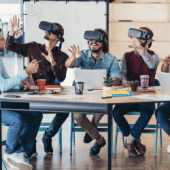How game-changing tech will revolutionize work with Dr. Ayesha Khanna, CEO of Addo AI
IN BRIEF
- 4:25 - Instead of thinking of AI as a threat, if we just changed our mindset and thought of it as our little assistant then we would have a much better perspective on it. We would actually then feel empowered instead of threatened.
- 13:45 - Technology has a bad side and we have to keep an eye on it. We have to make sure that any AI that helps in the workplace is not manipulative, is not biased and you need a very diverse and inclusive team to build AI and if we use it properly then it's very helpful.
- 19:17 - I think that by 2035, we're going to see a massive change with the metaverse. At least half of our work is going to be not on Zoom or in the office but in these virtual environments. We are going to have the ability to simulate every decision that we make in the company by doing forecasting analysis with tools to predict outcomes.
In this VISION by Protiviti interview, Joe Kornik sits down with Dr. Ayesha Khanna, Co-Founder and CEO of ADDO AI, an artificial intelligence solutions firm and incubator. She has been a strategic advisor on artificial intelligence, smart cities and fintech to leading corporations and governments. Khanna serves on the Board of Infocomm Media Development Authority, the Singapore government's agency that develops and regulates its technology sector to drive the country's digital economy and power its Smart Nation vision. She is also a member of the World Economic Forum's Global Future Councils, a community of international experts who provide thought leadership on the impact and governance of emerging technologies like artificial intelligence. Khanna says we should all think of AI as “our little assistant to help us becomes more efficient and productive” in the future.
HOW GAME-CHANGING TECH WILL REVOLUTIONIZE WORK WITH DR. AYESHA KHANNA, CEO OF ADDO AI - Video transcript
Joe Kornik: Welcome to the VISION by Protiviti interview. I’m Joe Kornik, Editor-in-Chief of VISION by Protiviti, where we look into the future to examine the implications of big topics that will impact businesses worldwide over the next decade and beyond.
We’ve got a great guest today as we welcome Dr. Ayesha Khanna, cofounder and CEO of Addo AI, an artificial intelligence solutions firm and incubator. She has been a strategic adviser on artificial intelligence, smart cities and fintech to leading corporations and governments. Ayesha serves on the board of the Infocomm Media Development Authority, Singapore’s government agency that develops and regulates its world-class technology sector to drive the country’s digital economy and power its Smart Nation initiative.
Ayesha is also a member of the World Economic Forum’s Global Future Councils, a community of international experts who provide thought leadership on the impact and governance of emerging technologies like artificial intelligence. Ayesha was named one of Southeast Asia’s groundbreaking female entrepreneurs by Forbes magazine in 2018, and Addo AI was featured by the publication as one of four leading artificial intelligence companies in Asia. Ayesha, welcome to the program.
Ayesha Khanna: Thank you so much for having me here.
Kornik: So, you’re the cofounder of Addo AI, an artificial intelligence advisory firm, and I think we can all agree that AI is going to radically transform how we work in the future. There are a lot of technologies I want to talk to you about, but let’s start with AI. Can you talk to me about AI and its impact? It’s already having an impact, but let’s talk about the impact it’s having, and then the impact it will have, on work over the next, let’s say, decade.
Khanna: The biggest impact that AI is having is that it has become a new team member in the workplace, and that’s the way we should look at it. It’s there as everyone’s little assistant, taking away a lot of the grunt work that we did, whether it’s legal, it’s HR, it’s manufacturing on the factory floor or it’s even doctors who are helping personalize their recommendations of diagnostics and prognosis for patients.
Once you have AI, it does a couple of things: First, it makes the work more efficient so you’re taking less time to achieve the same thing, which means now you can do other things that are of strategic value. The second thing that it does is, it allows you to optimize your work as well, which means without changing anything, for example, you’re getting more output in terms of if you are in a factory, you’re actually making a lot more output from the same inputs. Or, if you’re delivering goods, like we do with a large transport company, then you’re able to deliver more goods during the same time frame. These two are really important, and we haven’t even touched on the innovation, where you can transform yourself and serve your customers better.
Kornik: When a lot of people talk or think about AI, they think about the potential, for one. But a lot of people also are concerned that AI may make their job obsolete — it may make jobs go away. I always hear AI and the loss-of-jobs comparison made, and surely, with technology, some jobs will go away and probably won’t come back. But I know that you talk a lot about amplifying human potential in the technology revolution. So, how do we do this?
Khanna: That’s such a good question. People should be asking this question, because it’s true: Parts of every job, some tasks, will get automated, but that doesn’t mean the job goes away, the role goes away. If anything, it transforms into something that is easier for humans to do, which is emphasize the client, think about the larger strategy, enter new markets, design new products — that’s a much better use of the holistic skills that human beings have, the out-of-the-box thinking we’re capable of doing, rather than doing repetitive tasks every day. That’s what AI is.
That’s why I always say, instead of thinking of AI as a threat, if we just changed our mindset and thought of it as our little assistant, then we would have a much better perspective on it, and we would actually then feel empowered instead of threatened to go and get some new skills to go to the boardroom, to go to the leadership, and have ideas because we have a little assistant who’s doing the analytics and the forecasting and the optimization for us.
Kornik: So, Ayesha, I know that you deal with more than just AI. Since I have such a technology-savvy person on my show today, I want to ask you about other game-changing technologies that will have major impacts on the future of work, and I’d like to think like a decade out. If you could think about 2030 and beyond, what are the game changers in terms of technology?
Khanna: There are about three game changers that that are going to immediately have an impact: One is with the Internet of Things and 5G. For the first time, we are going to have data which is just not between people, but a lot more with things. It’s almost like every object around you becomes digital — the building becomes digital, every aspect of your kitchen becomes digital. So, what does that do to our lifestyle, to our work? It absolutely changes the way that we interact with each other and with our environment, and it hopefully makes it easier for us to personalize a more meaningful, efficient environment around us.
The second thing that is going to be very meaningful for the future of work is going to be the metaverse. This is when we’re using virtual reality to engage digitally with social presence in completely alternate universes rather than our physical spaces. This also changes the future of work, in terms of how we work with international colleagues, and, of course, it opens up so many more colleagues than one has just through Zoom. But it also opens up new kinds of work that will emerge — everything from fashion designers for digital clothing to more game makers to entirely new education classes being given in the metaverse.
Then, of course, we have robotics. We haven’t really seen robots — we’ve seen them either in the movies or we’ve seen the Roombas, but even if you come to cities like Singapore, it’s now become usual for us to go into the street and have vacuum cleaners, or in airports everywhere, there are robots that talk to you and say, “Please, could you have some social distancing” or “Could you throw that away?” We go to restaurants, we have robotic baristas and I haven’t seen that so much in the rest of the world, but we will live amongst machines and we will live in machine environments.
There are two things that happened: One, we need to anticipate this as employees, as leaders, as entrepreneurs, and we need to both adapt to it as workers and need to kind of think about it in an exciting and innovative way as entrepreneurs in our company. But then there’s always a third part: We have to have our ethics and our critical thinking hat around us and think about any unintended consequences. This allows us who work every day in our adult life, almost all of our other life, to enter into a new world of possibilities and to exercise every part of our brain and mind and creative juices to come up with responsible and exciting and interesting ways to serve customers.
Kornik: Interesting. Certainly, I’m not seeing a ton of robots around New York City yet. I’m sure they’re on their way. You mentioned the metaverse, and I’m curious: We’re in the early stages of the metaverse, and I’m wondering, the business applications, do you see it more as something that’s just fun to play around with? At what point do you think it becomes serious business, and how will the business applications of the metaverse be utilized?
Khanna: It’s absolutely going to become serious business, and there are 3.46 billion gamers in the world who are used to this environment. Remember, just because we are not gaming all the time doesn’t mean that there isn’t almost half the population that understands what it’s like to socially interact, to do trading — in other words, to have a digital economy. Now, the question is, what else can you do there?
Already, we’re seeing startups that are providing education in the metaverse — where, if you combine virtual reality and surgical rooms, for example, imagine doctors can experience unexpected crisis moments when a vein bursts, for example, instead of experiencing it for the first time in reality. This has shown to help some trainees deal better with unexpected situations. That’s just one little example. Another one is, if you literally want to have a concert for your entertainment, and you don’t want to spend huge amounts of money traveling around the world putting up unsustainably large concerts, Roblox has had many top pop stars earn millions of dollars — some of whom are not very well known.
It also opens up this whole area of independent creators to have access to another place without having to spend so much on marketing. NFTs — owning digital assets, how will it change the way that we actually talk about digital ownership? I’m working on some of these issues with some lawyers right here in Singapore. Everywhere you go, whether it is participating in the use cases in the metaverse or trying to build the structures around it, there are so many new jobs that will emerge that this is definitely worth keeping an eye on.
Kornik: That’s fascinating. You mentioned jobs, and obviously, I’ve heard a lot about talent shortages and recruiting and retention and how, specifically, AI could shape that in the future. There’s a role that that AI will play in that. When you look at the future of shaping workforces, will there be a role for AI, and how will that impact recruiting and maybe even retention?
Khanna: Artificial intelligence has a huge role in identifying talent, but not in a way that that takes in the unconscious biases that humans have had. If it’s designed properly, then it can nudge people. You can have an AI assistant, at a minimum, that is your personal HR counselor that you can talk to and that is giving you advice on what other jobs are available, that is communicating interesting things that you want to the leadership. And you can also have the typical ways of identifying talent by looking at job résumés, by looking at people, the way they answer questions, going beyond typical things like looking at your résumé — democratizing access to great jobs, to great work, by looking at your experience, by being a bit more nuanced, by looking at your skills, by giving you tests to do, by looking at the way you speak about your experience, instead of only hiring the elites. I’m very against elitism in the workplace.
It’s also very good when you think about our aging population. I didn’t talk about biotech, but biotech, and the fact that we’re going to live longer, is another big trend that’s going to affect the future of work. We are going to be with people who are 60, 70, 80, maybe over 100, as colleagues. On the one hand, you have machines and robots, and then, on the other hand, you have people who were never in the workforce when we were growing up because now there’s rejuvenative medicine. There was a case study where they said even elderly grandmothers can operate, and do great construction work that young men do, because they’ll be working with robots, and just think of the world of possibilities. Why should we put people in old people’s homes, where they’re bored? That’s what I mean by amplified potential for everyone across ages, genders, races, geographic locations.
But as always, Joe, as you know, technology has a bad side. We have to keep an eye on it. In other words, we have to make sure that any AI that helps in the workplace is not manipulative, is not biased, and you need a very diverse and inclusive team to build AI. And if we use it properly, then it’s very helpful.
Kornik: I was going to ask you about sort of technology’s role and AI’s role in the many traditional HR functions. There’s a role for it in training or leadership development, talent management, keeping employees engaged. For some of the more traditional HR roles, how do you see AI playing in that space?
Khanna: There are a couple of things: First, recruiting — identifying the right people and allowing people to be adaptive. The problem with HR right now is that it is difficult: There’s a quarterly review. People feel shy about what they want as a career change. They don’t know what’s happening. But if there is a little HR assistant that you have, its job is to observe some of the things you’ve been writing in a confidential manner, some of new meetings you’ve been participating in, and it realizes, “Ayesha, you’ve been doing data science for a long time, but it looks like you’re getting some good feedback on your business skills and the fact that you’re doing some strategy. Have you considered doing that?”
There is a talent war, and you have to keep your employees constantly evolving, learning and feeling that they’re doing exciting things. So, build an entirely different HR culture which is rewarding people as they’re learning because it’s observing them, which humans can’t do alone. It’s observing them in a safe, private manner just for them and giving them those nudges. It is very helpful, and if you allow those nudges to be communicated up to HR, then HR becomes aware of these talents as well and can place you in different geographies or locations or different departments, and that’s what’s going to change.
Kornik: What’s your call to action for business leaders as they prepare for their companies to be human-centric in this technology revolution?
Khanna: The most important thing is to not think that the technology is going to solve your problem, but to sit down with your senior leaders — have a design thinking offsite and say, “Guys, what is our goal?” and then you call in either your data science team or a provocateur. We often go in as provocateurs and ask them, “Guys, this is what we want. How could AI help or disrupt businesses?”
You’re always looking at two things: You’re not just looking at “How can it help me?” You’re also looking at your competitors or an Amazon that comes out of nowhere and takes business away, and then you work backwards from what you know is important to your customers, and you’re trying to understand how they’re changing. You keep your eye on the ball, which is your enterprise or your retail customers, and then work backwards from there and see, what are your competitors doing? How are your client’s preferences changing, and what are your investor goals or stakeholder goals? And then, based on that, you have a plan. Then it has to be very agile — actually, the new word is hyperagile. You need to test things. You begin to have small tests for three months each, and then, very quickly, those couple of tests become these rallying calls for the whole organization.
Now, here’s the difference between the old way — and by “old way,” I mean “a few years ago” — and the new way: In the old way, people would do these little tests, and they were these shiny little objects we talked about in the media, but it wouldn’t lead to at-scale transformation for the company. But now, with the cloud, there’s a way that you can make your technique and ask them. But every little pilot we do, make sure that it builds the foundation for 100 more — just make it right from the start — and this is called modernizing your data architecture.
And if you do that, then, even if that doesn’t work, you set yourself up for four others. You trained for the marathon. You didn’t win the marathon, but guess what? You can now do 17 other sports, and you’re much better and more athletic at it, and that’s really the purpose — to think beyond that one thing, to use it to build your muscles, and it starts with that workshop starting with your leadership team.
Kornik: Ayesha, thank you. I have one final question before I let you go, and it’s one that we like to do here at Vision by Protiviti, which is, we look out, and we ask for bold predictions. I’d like you to look out to, say, 2035. Think about all these technologies, all their potential, and, assuming we get it more right than wrong, what does work look like from a technology perspective in 2035. What may surprise us? What haven’t we thought of?
Khanna: By 2035, we’re going to see a massive change with the metaverse. We’re going to see that at least half of our work is going to be not on Zoom or in the office but in these virtual environments, and we are going to have the ability to simulate every decision that we make in the company by doing forecasting analysis with tools, trying to imagine if we build a new factory, what would happen under different scenarios? There will be digital twins for everything that we do, and this will allow us to experiment with more confidence. It will allow us to be agile and be light on our feet. That’s just the way, and where, we’ll be working.
But talent will be very different. I don’t want to say we’ll be highly dependent on these little assistants, but to a degree, we will, and we’ll each have our own, because right now, we don’t have our own. We have this one that we go and talk to, and it’s some FAQs. But we’ll each have our own little assistant.
Some of us are used to personal assistants, but for the vast majority that are not, it’s really fun. It’s nice to have somebody who’s totally helping you, whether you’re a data scientist or a lawyer or anything. You could ask any questions. I could say, “I’m going to meet an economist. Can you give me — on Romer’s growth theory, just give me an update,” for example. They’ll quickly do that for you, or I’m running this forecast, and it’ll all be voice-driven. You’ll just talking a lot more and typing up less. That will free you up. Not only will give you information, it will also free up your mind, and we don’t remember what it’s like. Even CEOs are in so many meetings all the time. A lot of it is just bureaucracy.
And then, finally, in general, people will not tolerate any kind of unfairness, bias, lack of inclusivity, lack of sustainability, and people will use these metrics. People will use AI to rank companies, especially for consumers. And this kind of thing will not just be people speaking in magazines or conference panels, but values will separate the companies that do well from those that don’t. I think that’s a wonderful evolution, and even though AI will not be responsible for it, it will help all these young people and people who care about the planet use AI and technology to get to that point.<>Joe Kornik: Ayesha, I enjoyed our conversation immensely. That was so enlightening. Thank you so much for taking the time be to with us today.
Khanna: Thank you so much for having me.
Kornik: Thank you at home for watching the VISION by Protiviti interview. I’m Joe Kornik, and we’ll see you next time.
Did you enjoy this content? For more like this, subscribe to the VISION by Protiviti newsletter.






























